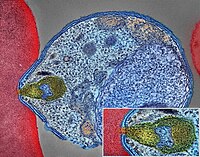
Photo from wikipedia
Background: Severe falciparum malaria (FM) has more predilections to affect the liver resulting in raised serum transaminases. When the levels are more than 3 times the upper limit, it is… Click to show full abstract
Background: Severe falciparum malaria (FM) has more predilections to affect the liver resulting in raised serum transaminases. When the levels are more than 3 times the upper limit, it is known as malarial hepatopathy (MH). The liver function test is an important tool to predict complications and prognosis in patients with FM, which should be done at the earliest. Objective: The objective of the study was to study the patient characteristics, presenting features, and complications of malaria in patients with MH and to compare these with patients who had normal liver enzymes. Materials and Methods: This case–control study was carried out on 76 children of the age group of 1–10 years suffering from FM admitted in the department of pediatrics of a tertiary hospital of Bihar. All admitted children suffering from FM were divided into two groups based on the presence of MH as cases and controls. Various parameters were compared between these two groups and the results were interpreted. Data were collected and the results were analyzed by SPSS v23 software. Results: Baseline characteristics were comparable in both groups. Among cases, 90.9% had an altered level of consciousness and 72.7% had convulsions at admission, in comparison to 50.0% and 25.9% among controls. A total of 68.1% of cases of MH presented with icterus, compared to 3.7% of the controls (p<0.0001). Patients of MH who suffered from renal failure were 18.1%, compared to 1.8% among controls (p=0.0321). Among cases, 36.3% suffered from hypoglycemia, compared to 12.9% among controls (p=0.0251). The mean hemoglobin (Hb) levels among cases were lower as compared to controls (p=0.0002). A total of 36.3% of cases and 12.9% of controls expired due to the disease (p=0.0251). Conclusion: MH is associated with a higher incidence of complications such as altered sensorium, seizures, icterus, raised bilirubin levels, renal failure, increased chances of hypoglycemia, and lower mean Hb levels and a poor outcome.
Journal Title: Israel Journal of Chemistry
Year Published: 2020
Link to full text (if available)
Share on Social Media: Sign Up to like & get
recommendations!